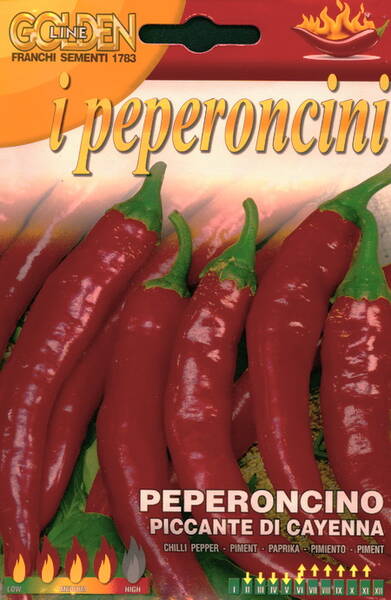Your shopping cart is empty!
Chilli pepper "Piccante di Cayenna"
Hot pepper "Piccante di Cayenna" is an integral part of Mexican, African and Asian cuisine. Without a pronounced taste, it gives the dish a burning sensation and completely changes the taste and aroma of food, gives a special piquancy to meat, fish, cheese, and vegetable dishes.
Early ripe (48-55 days from planting seedlings), intended for cultivation in open ground and film greenhouses, is one of the most common varieties of hot pepper in the world. The plant is thermophilic, reaches 60-90 cm tall. Ripe fruits are bright red in color, elongated-conical in shape, weighing 25-35 g. The pulp is dark red, thick. Burning and pungent in taste, the fruits contain a large amount of vitamin A and C.
The degree of burning on the Scoville scale: 30000-50000 units (SHU).
Variety value: resistance to tobacco mosaic virus, high yield, abundant and long fruiting, heat resistance.
The alkaloid capsaicin gives it a burning taste. It is widely used in medicine for the manufacture of mustard plasters and ointments, capsaicin acts depressingly on malignant cells, pepper tincture helps with headaches, strengthens the body's defenses, prevents the development of atherosclerosis, and normalizes blood pressure.
A strong aphrodisiac (especially for men), it can stimulate the production of “happiness hormones”.
Hot pepper also has antioxidant properties, improves appetite and digestion, reduces the risk of diseases of the cardiovascular system, and improves blood circulation.
Agricultural technology.
Sowing: seeds are sown for seedlings in late February-early March. Dive in the phase of 1-2 true leaves. In unheated greenhouses, 60-65 day old seedlings are planted in late May - early June, according to a 50 x 40 cm scheme. Loamy, breathable soils are preferred.
Good predecessors are cucumber, legumes, cabbage.
Care: pepper is responsive to the application of phosphorus-potassium fertilizers for better fruit set and fertilizing with nitrogen fertilizers throughout the growing season. Plants are demanding on soil moisture and low air humidity. Therefore, watering is carried out after sunset with warm water under the root. For the development of the root system, regular loosening of the soil should be carried out.
Early ripe (48-55 days from planting seedlings), intended for cultivation in open ground and film greenhouses, is one of the most common varieties of hot pepper in the world. The plant is thermophilic, reaches 60-90 cm tall. Ripe fruits are bright red in color, elongated-conical in shape, weighing 25-35 g. The pulp is dark red, thick. Burning and pungent in taste, the fruits contain a large amount of vitamin A and C.
The degree of burning on the Scoville scale: 30000-50000 units (SHU).
Variety value: resistance to tobacco mosaic virus, high yield, abundant and long fruiting, heat resistance.
The alkaloid capsaicin gives it a burning taste. It is widely used in medicine for the manufacture of mustard plasters and ointments, capsaicin acts depressingly on malignant cells, pepper tincture helps with headaches, strengthens the body's defenses, prevents the development of atherosclerosis, and normalizes blood pressure.
A strong aphrodisiac (especially for men), it can stimulate the production of “happiness hormones”.
Hot pepper also has antioxidant properties, improves appetite and digestion, reduces the risk of diseases of the cardiovascular system, and improves blood circulation.
Agricultural technology.
Sowing: seeds are sown for seedlings in late February-early March. Dive in the phase of 1-2 true leaves. In unheated greenhouses, 60-65 day old seedlings are planted in late May - early June, according to a 50 x 40 cm scheme. Loamy, breathable soils are preferred.
Good predecessors are cucumber, legumes, cabbage.
Care: pepper is responsive to the application of phosphorus-potassium fertilizers for better fruit set and fertilizing with nitrogen fertilizers throughout the growing season. Plants are demanding on soil moisture and low air humidity. Therefore, watering is carried out after sunset with warm water under the root. For the development of the root system, regular loosening of the soil should be carried out.















